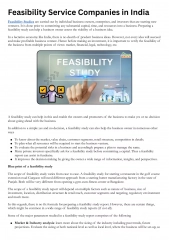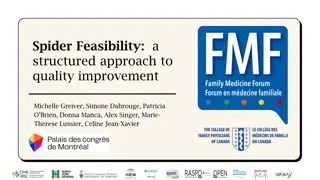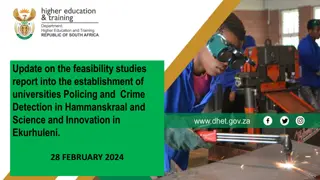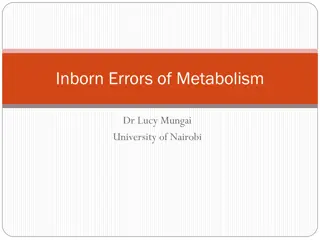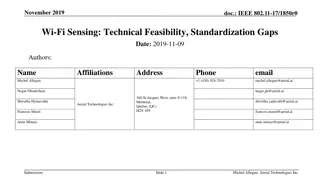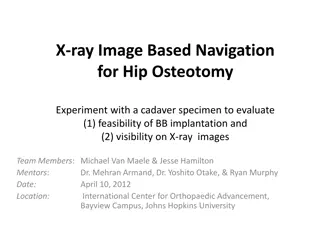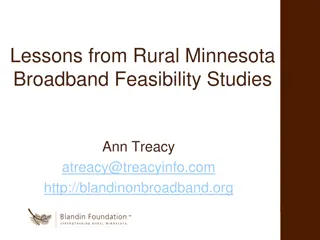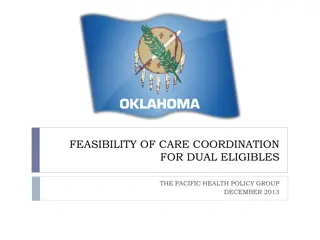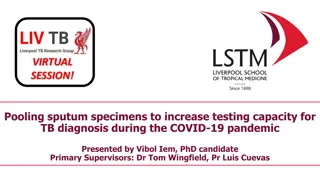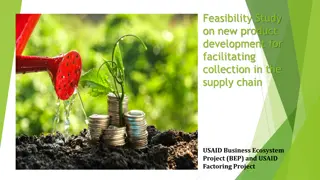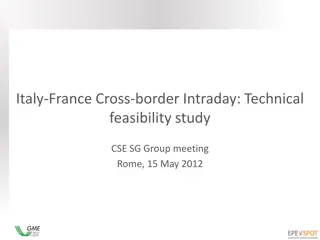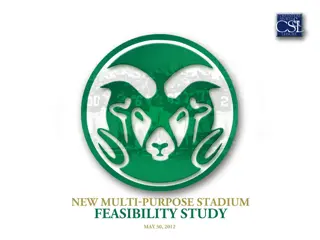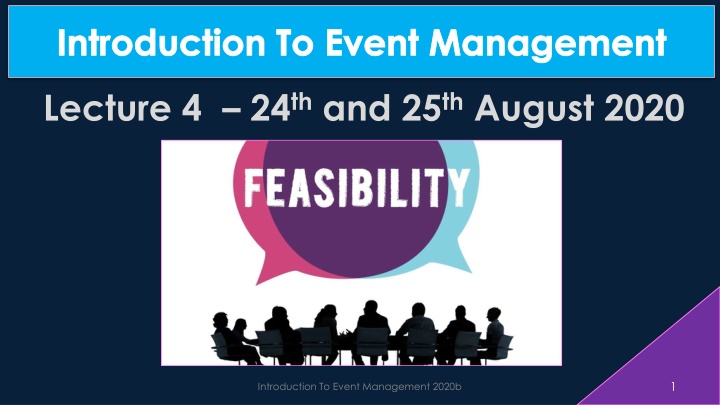
Feasibility Study in Event Management: The Key to Successful Planning
Understand the importance of feasibility studies in event planning, learn key factors to consider, and create an outline feasibility study for a new event. Explore examples of feasibility reports and resources for conducting successful events like an outdoor food festival. Feasibility studies are crucial in determining the practicality of proposed plans and ensuring event success.
Download Presentation

Please find below an Image/Link to download the presentation.
The content on the website is provided AS IS for your information and personal use only. It may not be sold, licensed, or shared on other websites without obtaining consent from the author. If you encounter any issues during the download, it is possible that the publisher has removed the file from their server.
You are allowed to download the files provided on this website for personal or commercial use, subject to the condition that they are used lawfully. All files are the property of their respective owners.
The content on the website is provided AS IS for your information and personal use only. It may not be sold, licensed, or shared on other websites without obtaining consent from the author.
E N D
Presentation Transcript
Introduction To Event Management Lecture 4 24th and 25th August 2020 1 Introduction To Event Management 2020b
Staffing Task for today For the same event as this weeks planning task Create a staff plan for your event (3 4 slides) Hierarchy chart Job titles for core team What volunteers are required Write one job description for one of the job roles Submit to HISP for the next lecture 2 Introduction To Event Management 2020b
Reading for Lecture 4 - Feasibility Read the examples of feasibility reports on HISP Lecture 4 Make your own notes from the following books: Bowdin et al. (2011) Events Management. 3rd Ed. EBH: Oxford. Ferdinand, N. and Kitchin, P. 2nd Ed. Events Management: An International Approach. Sage: London Goldblatt, J. (2011) Special Events: A New Generation and the Next Frontier. 6th Ed. Wiley: New Jersey pages 41 to 51 Getz, D. (2012) Event Studies: Theory, Research and Policy for Planned Events. 2nd Ed. Routledge: London 291 297 (From Research, evaluation and information management) 3 Introduction To Event Management 2020b
Learning Outcomes By the end of the session, you should be able to: 1. Have a defined knowledge of the importance of conducting a feasibility study prior to event planning. 2. Understand the key factors that event managers must consider when conducting a feasibility study 3. Create an outline feasibility study for a new event. 4 Introduction To Event Management 2020b
Feasibility the possibility that can be made, done, or achieved, or is reasonable Feasibility simply means that you have looked at the event design objectives to determine if what you propose is practical given the resources available (Cambridge Dictionary, 2020) (Goldblatt, 2011. p56) How easy or difficult it is to organise an event. We are going to look at the feasibility of organising an outdoor food festival in Sorenberg in 2021. 5 Introduction To Event Management 2020b
Feasibility Study an assessment of the practicality of a proposed plan or method. Feasibility study is the initial design stage of any project, which brings together the elements of knowledge that indicate if a project is possible or not. (Dictionary, 2019) A feasibility study is the final stage before actual event planning starts. 6 Introduction To Event Management 2020b
Feasibility Study Goldblatt (2011) states there are three basic resources to consider for a feasibility study 7 Introduction To Event Management 2020b
Feasibility Study What are some other event factors that would be considered for a feasibility study? 8 Introduction To Event Management 2020b
Feasibility Study Ferdinand and Kitchin (2017) designed a framework module to highlight a procedure for conducting a feasibility study. This involved four main factors for event organisers to consider when planning to do a feasibility study: 1. Feasibility 2. Viability 3. Desirability 4. Stakeholder Expectations 9 Introduction To Event Management 2020b
Feasibility Event Objectives Events are organised to achieve set objectives Celebrate an occasion Awareness of a new product Increase cultural awareness Regional economic development Feasibility Viability Stakeholder Expectations Event managers must refine these objectives into actionable goals. Each event has varying characteristics. Time Cost Quality Desirability What characteristic is normally not negotiable? TIME! (Ferdinand and Kitchin, 2017) 10 Introduction To Event Management 2020b
Feasibility Event Objectives The feasibility component describes all the components of the event to be delivered. Their desired level of performance and the means of supply. Event managers need to determine the tangible elements of the event: what might these be? Staging Equipment Decorations Feasibility Stakeholder Expectations And the intangible elements: what might these be? Licenses and permits Skills of labor force (Ferdinand and Kitchin, 2017) 11 Introduction To Event Management 2020b
Viability Event Objectives Events need to achieve financial goals So the viability component will assess the business case for a proposed event. Viability Hospitality events generally are required to fit within organisational financial constraints or budgets. Stakeholder Expectations Other kinds of events may be required to generate an expected return or profit. (Ferdinand and Kitchin, 2017) Or expected to attract a certain amount of people. 12 Introduction To Event Management 2020b
Desirability Event Objectives Event ideas / concepts need to be desirable to both internal and external stakeholders. A distinctive event theme provides several benefits to event organisers: An exiting concept / theme will motivate and have more interest to the event organisers and external stakeholders It will help to differentiate the event from previous events and competitors. This will allow organisers to build anticipation or a unique or distinctive experience to their potential audience Stakeholder Expectations Desirability (Ferdinand and Kitchin, 2017) 13 Introduction To Event Management 2020b
Stakeholder expectations Planning and implementing events is always a learning process for both event managers and stakeholders. Stakeholders are most likely the key group of people who will have the final say as to whether an event will have the green light to happen. Stakeholder Expectations This process starts from the feasibility stage. (Ferdinand and Kitchin, 2017) 14 Introduction To Event Management 2020b
15 Introduction To Event Management 2020b
Risks Feasibility The staging of events has risks for the organisers that should be analysed and understood. The organisers need to have a relative degree of confidence that: The event will not result in a financial loss The event is organised sufficiently well that all parties are satisfied The organisation's mission will be enhanced as a result of staging the event The risk of injury is minimised as far as possible There are contingency plans to ensure the safety and well-being of all participants The venue and equipment will not suffer unexpected damage or loss The reputation of all parties (including the sponsor if one exists) as event organisers remains in tact 16 Introduction To Event Management 2020b
Time Feasibility There are a number of crucial factors that determine whether there is sufficient time to make all the necessary plans and arrangements to stage a special event. In particular, the two most important factors are: the ability to book a venue; and the necessity to give participants an appropriate length of notice Venues at times need to be booked months in advance It is not possible to organise an event unless the hosting organisation has a venue booked. The time needed to plan and organise the event must be sufficient to ensure that a venue can be booked. The second factor is having sufficient time to promote the event also suggest that would-be organisers should look very closely at the time allowed to complete all tasks 17 Introduction To Event Management 2020b
Funding Feasibility The feasibility study needs to be able to predict the financial outcome of staging an event to a reasonable degree of accuracy. This entails developing a budget where all expected revenues and all known costs are listed. It is most important that would-be organisers exercise a high degree of realism when estimating possible revenues. Furthermore, it is vital to ensure that all costs are included. Two typical situations can spell disaster: 1. The event goes ahead despite the loss of a major source of income i.e. sponsorship is not as much as planned, a funding submission to government fails or only half as many participants enter An unexpected cost arises but it is too late to cancel or change the event i.e. venue costs escalate, errors are made in calculating the cost of officials, or extra equipment has to bought at the last moment 2. History shows numerous organisations large and small that have run into financial difficulty and even bankruptcy as a result of staging an event. A general rule for running events is that they must not run at a loss except in special and planned circumstances. Therefore it would be prudent to ensure the initial budgeting processes are accurate and to aim for substantial profit 18 Introduction To Event Management 2020b
Support Feasibility The feasibility study must gauge whether there is support for the event from within the organisation. This is vital as an event is generally work and many helpers must be found. Organisational meetings and numerous one-to-one consultations will usually provide evidence whether support exists. Events often need support from outside the hosting organisation if they are to be successful. Some of the reasons to contact and consult other organisations include: To estimate the amount of interest in participating To seek assistance with equipment lending To share facilities and venues To seek sponsorship or funding If the support that an event needs for participants, officials, helpers, sponsors and other interested parties is not forthcoming then there must be considerable doubt about the feasibility of this organisation to stage this event at this time 19 Introduction To Event Management 2020b
Staffing Feasibility The human resources required to plan, organise and stage an event includes everyone from the Event Director down to volunteers who serve at the food stall. It is necessary to assess whether the organisation has or is likely to have sufficient personnel for all event management tasks. If no-one is willing to offer themselves as a event director or there is no- one with appropriate experience who is affordable, then it must be assumed that the organisation is unlikely to be successful at staging the event. Furthermore, at the feasibility assessment stage, it is important to count, analyse and understand the myriad of tasks required and to determine whether there is sufficient number of available personnel. Provided there is sufficient time, inexperienced personnel can be trained. 20 Introduction To Event Management 2020b
Venue & equipment Feasibility Those are responsible for assessing the feasibility of an event must consider whether there is access to a suitable venue. The venue should be equal to or better than the standard expected by all participants and other stakeholders. There are dangers for the organisation and sport/recreation activity if the venue is substandard. Therefore a lack of a suitable venue has a major effect on event feasibility. Some categories of equipment such as personal sports apparatus are the responsibility of the competitor. Other types of equipment such as scoreboards, lighting and timing equipment are the responsibility of the organiser. If the organisation does not own sufficient equipment to stage an event it can be bought, borrowed or hired provided there is time and funds available. There may be a feasibility problem if sufficient equipment does not exist locally and it is too difficult or expensive to transport equipment from other places 21 Introduction To Event Management 2020b
Environmental Feasibility The staging of events generally has some environmental impact. This may range from traffic congestion and parking problems to damage sustained by the environment. The following are some examples of the environmental impact of an event: Damage by cars in an off-road area Noise pollution Traffic congestion Sanitary problems Danger to fauna and flora Water pollution e.g. power boat racing 22 Introduction To Event Management 2020b
Feasibility Task pairs or 3s Make a short seminar that would outline the feasiblilty requirements for a new event in Sorenberg. HTMi Food Festival Summer 2021 2 days 10am 8pm Open air event held in the Volg car park Food stalls Live music and entertainment Activities Submit to HISP for Monday 31st August 23 Introduction To Event Management 2020b
Feasibility for your EMP Your Event Management Plan should have reference to the importance of conducting a feasibility study and this should also mirror your knowledge on the key factors that need to be taken into consideration when conducting a feasibility study for an event. 24 Introduction To Event Management 2020b
References Bowdin et al. (2011) Events Management. 3rd Ed. EBH: Oxford. Chapter 10, page 323 364 Ferdinand, N. and Kitchin, J, P. (2017) Events Management: An International Approach. 2nd Ed. Sage: London. Goldblatt, J. (2011) Special Events: A New Generation and the Next Frontier. 6th Ed. Wiley: New Jersey Getz, D. (2012) Event Studies: Theory, Research and Policy for Planned Events. 2nd Ed. Routledge: London 297 - 302 25 Introduction To Event Management 2020b
Next Lecture Event Administration No homework task work on Task for next week Read up on all slides and topics so far 26 Introduction To Event Management 2020b


